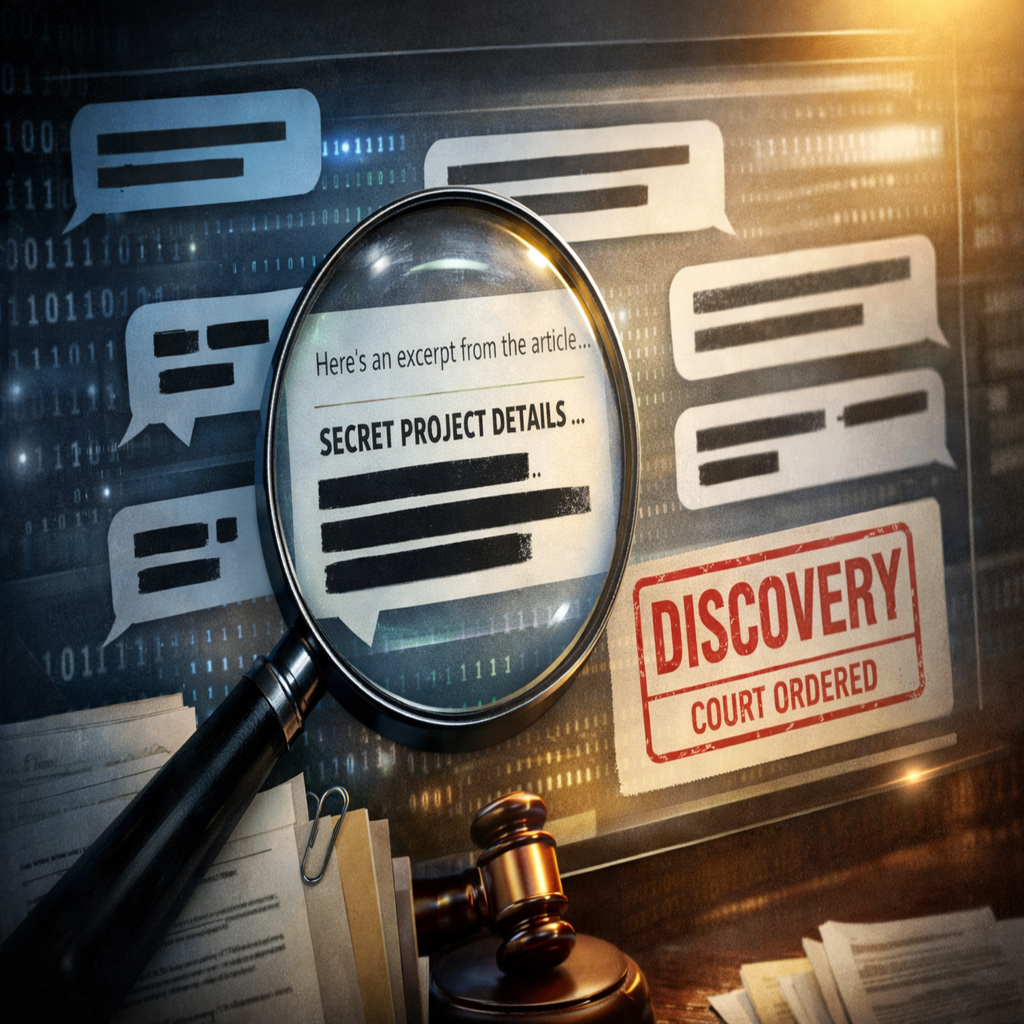Insights < BACK TO ALL INSIGHTS
Chatbots, Copyrights, and the Courts: The Latest in Litigation Developments in the Cases Against OpenAI
FEATURED
January 5, 2026
Chatbots, Copyrights, and the Courts: The Latest in Litigation Developments in the Cases Against OpenAI
By: Abbey Block
Litigation Update: Open AI’s Discovery Woes and Fair Use Defenses in Infringement Lawsuits Since its formation in 2015, the artificial intelligence company “Open AI” – most known for its creation of the widely used chatbot, “ChatGPT” – has faced its fair share of legal disputes. Two of the most notorious lawsuits, one filed by the New York Times and the other by a class of prominent fiction authors, are moving full steam ahead, illustrating the complex interplay of legal rights, litigation tools, and technological innovation. This blog post examines the most recent developments in the lawsuits, and considers what these developments mean for the parties, and the future of artificial intelligence more broadly. Judge Orders Open AI to Disclose Chat…
The Truth Will Out – Even About Mar-a-Lago
December 27, 2025
The Truth Will Out – Even About Mar-a-Lago
By: James Trusty
The Truth Will Out is a fairly obscure phrase that was popularized in Shakespeare’s “The Merchant of Venice.” It suggests that even against the most active obstruction and obfuscation, the Truth seemingly has an invisible hand behind it that relentlessly—if slowly—pushes it into plain view. Nearly 2 ½ years after the FBI’s raid on Mar-a-Lago, the Truth may be emerging into the daylight. August 8,…
White-Collar Sentencing Under the Amended Guidelines: Fewer Steps, Same Dance
November 12, 2025
White-Collar Sentencing Under the Amended Guidelines: Fewer Steps, Same Dance
By: Robert Ward
For years, the U.S. Sentencing Commission’s Guidelines Manual has guided courts through a three-step process to determine the sentence to be imposed. At a high level, that process looked like this: First, the court would calculate the guideline range based on relevant offense conduct and related factors, along with the defendant’s criminal history. Second, the court would consider the Sentencing Commission’s policy statements or commentary…
A Conservative Argument For Legalizing Online Gambling
August 16, 2010
A Conservative Argument For Legalizing Online Gambling
By: Ifrah Law
Conservative columnist Michelle Minton just wrote an interesting op-ed piece for Forbes.com on why Republicans, and by extension, conservatives in general, should favor legalized Internet gambling. Minton’s arguments come in the wake of the recent passage by the House Financial Services Committee of a bill that would legalize Internet gambling, including online poker, in the United States and set up a federal regulatory framework for…
Lesson From Ex-Congressman’s Plight: Follow Rules, Come Clean
August 13, 2010
Lesson From Ex-Congressman’s Plight: Follow Rules, Come Clean
By: Ifrah Law
Federal prosecutors often take very seriously the prohibitions on illegal lobbying and on withholding the truth from the FBI. That’s one of the lessons that former U.S. Rep. Mark Siljander probably learned last month when he pleaded guilty to two federal charges relating to his alleged ties to an Islamic charity claimed to have funded money to international terrorists. When Siljander was indicted in January…
In Lerach Case, An Interesting Sentencing Distinction
August 11, 2010
In Lerach Case, An Interesting Sentencing Distinction
By: Ifrah Law
The U.S. attorney’s office in Los Angeles just took an interesting and nuanced position concerning a very high-profile request for community service as part of a guilty plea. Disgraced plaintiffs attorney William Lerach pleaded guilty in 2007 to a charge of conspiring to obstruct justice and make false statements in many of his law firm’s class actions. He completed a two-year prison term and is…
Honest Services Fraud — Still Alive and Kicking?
August 9, 2010
Honest Services Fraud — Still Alive and Kicking?
By: Ifrah Law
We wrote recently that the very recent Supreme Court decision in United States v. Skilling, limiting the reach of the federal “honest services” statute, may have an immediate impact on the ongoing case against Kevin A. Ring, a former associate of Jack Abramoff. See “Skilling Having Impact on Pending Honest Services Fraud Cases,” July 28, 2010. But last week, U.S. District Judge Ellen Segal Huvelle…
Court Places Limits on DOJ’s Asset Forfeiture Powers
August 4, 2010
Court Places Limits on DOJ’s Asset Forfeiture Powers
By: Ifrah Law
The D.C. Circuit recently handed a significant victory to anyone with assets in the U.S. – especially anyone under investigation in another country for violation of that country’s laws. As reported on the Blog of Legal Times, the D.C. Circuit issued a decision on July 16 holding that the Department of Justice could not seize the assets of two funds pending Brazil’s investigation of the…





